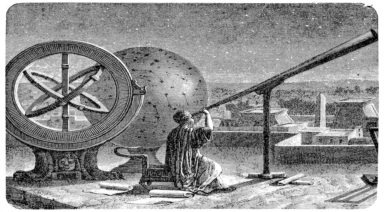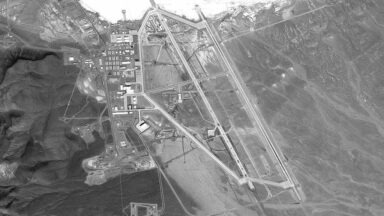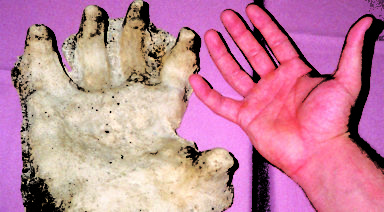DNA Might be the Best Bargaining Chip We Have With Aliens

If we ever needed to barter with an advanced alien species, our DNA might be the best currency we could offer, according to Daniel Helman, a professor of Labor Relations and Trade Unions at Ton Duc Thang University in Vietnam.
That’s because our technology would likely be antiquated compared to theirs, making it essentially useless in trading and bargaining. But if we could give them something completely unique to our specific planet, there’s a good chance they may be interested.
Helman first proposed this idea at the International Space Development Conference, and later expanded on it in an interview with Motherboard.
Our DNA he said, is like a record of millions of years of evolution and interaction with Earth’s environment, and if we could give them mapped-out documentation of this, they may consider it useful. The Human Genome Project and other attempts to catalogue our DNA would be a good starting point to begin negotiations.
Barring the possibility these extraterrestrials might have some sort of highly advanced system to fast track DNA sequencing, we would already have a solid foundation of background knowledge in epigenetics – how the environment affects the expression of genes – and evolutionary processes that have led to most modern species on Earth.
Helman also points out that he believes our gradual destruction of biodiversity on the planet lowers the number of bargaining chips we hypothetically have to trade. The more animals go extinct, the less DNA we have – unless we start storing embryos and DNA samples in the Doomsday Vault.
Though, one concern with Helman’s idea is that giving up the building blocks to life on Earth might lead extraterrestrials to develop diseases that could wipe us out. But if they had technology vastly superior to anything we have, they would probably have the means to destroy us in a number of ways.
Essentially, the argument hinges on whether these extraterrestrial visitors are bent on conquering or making friends with us. A timeless hypothetical, but for the sake of Helman’s argument, we should consider the latter scenario.
And in the sense that our biggest obstacle to the next level of technological advancement is surviving ourselves, it’s more likely that developed alien species would lean towards the peaceful side. For us, perpetual global conflicts and the looming threat of nuclear war could be the deciding factor in whether we continue as a species that explores the galaxy or destroys itself.
So, if an alien race has advanced far enough to make it to Earth, it’s likely our global infighting and environmental destruction would look petty and archaic to them. So it might be time we develop a disruptive marketing strategy for our DNA, and prepare for an intergalactic game of poker.
Watch Chase Kloetzke discuss the potentials of various agendas an alien species might have visiting Earth on this episode of Beyond Belief:
Nordic Aliens: What We Know About These Extraterrestrials

Ancient civilizations around the world have spoken of angelic beings that descended from the sky, sent by God to assist humanity by sharing their spiritual and emotional wisdom with Earthlings. These mythological entities appear to continue their mission to this day, and many believe they are emissaries from outer space, an extraterrestrial species known as the Nordic or Pleiadian race.
What Are Nordic Aliens?
The Nordics are an ancient alien species that have been reported in contact with various civilizations throughout history. Many accounts suggest that they may have been interacting with early human societies, perhaps influencing ancient cultures under the guise of gods or advanced beings. Descriptions often portray them as tall, fair-skinned beings with blond hair and blue or green eyes – similar to the physical characteristics of the historical Nordic race – radiating wisdom and serenity.
Initially, Nordic Aliens identified themselves as being from Venus and later from the Pleiades star cluster, particularly the planet Erra. However, their true origin remains a subject of debate, and they may prefer to keep their true home a secret for security reasons. Many regard the Nordics as benevolent guides, part of a greater Galactic Federation working to support humanity’s awakening and evolution.
Mythology and History
Nordic aliens, also known as Tall Whites, Pleiadians, Venusians, and Space Brothers, are often regarded as angelic beings who have appeared in humanity’s stories since ancient times. Many believe these luminous visitors were revered as gods, teachers, or messengers of light, guiding early civilizations and shaping spiritual traditions around the world.
Their influence is said to echo through ancient myths, sacred texts, and folklore that describe radiant beings descending from the heavens to share wisdom and technology with humankind, such as the following:
- Some researchers suggest these extraterrestrial beings may have visited ancient Mesopotamia, influencing Sumerian culture with their advanced knowledge.
- Ancient Egypt’s advanced astronomical and engineering skills, along with depictions of tall, fair-skinned beings, hint at possible Nordic alien influence.
- Ancient Greek mythology’s descriptions of gods and demigods resemble the physical traits attributed to these beings, further suggesting early encounters.
- Viking folklore and Norse mythology describe gods with characteristics akin to those of Nordic aliens, suggesting visits to ancient Scandinavia.
- Indigenous cultures in the Americas, such as the Hopi tribe, have prophecies of “True White Brothers,” while Mesoamerican legends speak of white-skinned gods.
- Ancient Indian texts describe fair-skinned deities and advanced flying machines, potentially linked to Nordic aliens.
Across modern accounts and popular culture, Nordic aliens continue to be seen as benevolent forces connected to spiritual awakening and the evolution of human consciousness.
Common Nordic Aliens
Nordic aliens are often described in various ways based on their appearances and the traits attributed to them.
Here are some commonly mentioned types:
Hopi
The Hopi people, an indigenous group in North America, have legends about various star beings or ancestors. Some interpretations suggest that these beings were tall and fair-skinned, similar to the Nordic archetype. These peaceful entities are believed to be the True White Brothers, foretold in Hopi prophecy, signaling the end of the fourth age.
Vril Society
The Vril Society is a controversial and often debated topic in ufology and occult circles. This secret society, reportedly active in the early 20th century in Germany, was said to be interested in advanced technology and hidden knowledge. While generally seen as a benevolent species, there’s a chance the Nordics influenced the Vril Society. Some factions might have deviated from the path of light, aligning with malevolent entities opposing the human race.
Agarthans
Agartha is a mythical realm said to exist within the Earth’s hollow interior. In this context, Agarthan Nordics are described as residing in this hidden world and possessing advanced technology and knowledge. They are often portrayed as having tall stature and fair features.
Pleiadians
Pleiadian Nordics are among the most well-known in contemporary UFO and New Age literature. They are said to come from the Pleiades star cluster, which is a group of stars located about 400 light-years from Earth.
Descriptions of Pleiadian Nordics typically include tall, attractive humanoid aliens with blonde hair and blue eyes who are benevolent and advanced. They are often described as being involved in guiding humanity, offering spiritual guidance, or even intervening in global issues to help prevent disasters or promote peace.
Venusians
Venusian Nordics are claimed to come from Venus, one of Earth’s neighboring planets. This type of Nordic is often depicted similarly to other Nordics but with some slight differences in their physical appearance or technology, reflecting their planetary origin. Reports of Venusian Nordics often focus on their advanced knowledge and technology, as well as their interest in interacting with or guiding humanity when visiting Earth.
Each of these types reflects the varied ways in which different cultures and speculative traditions interpret the concept of Nordic aliens.
Characteristics of Nordic Aliens
Nordic alien descriptions can differ, but the following points provide a consistent overview of their characteristics.
Physical Appearance
Nordics are perhaps the most human-like in appearance of all the different types of aliens and closely resemble people of Scandinavian or Aryan descent. They tend to have reddish to blond hair and green or blue eyes, and stand anywhere from 5 to 7 feet tall. Some claim that Nordics lack irises and wear contact lenses to blend in when visiting our planet. Many also claim that these beings lack a sense of smell. Nordics are also claimed to be fourth- and fifth-density beings.
These descriptions are commonly associated with flying saucers, UFO sightings, and abduction phenomena within European nations such as Denmark, Germany, Iceland, Norway, and Sweden.
They can easily pass as Earthlings, and those who have been in contact with this alien race state that their appearance allows them to freely explore our planet.
Modes of Transportation
Nordics are generally observers, sometimes viewing events and contactees from within their spacecraft, which range from spherical to cigar-shaped.
Their spaceships are often described as radiant and silent, capable of moving through the sky with no visible propulsion or sound. Witnesses report that these craft can appear and disappear suddenly, as though shifting between dimensions rather than traveling through ordinary space. Some contactees claim that the ships are powered by light or thought itself, allowing them to move instantly across vast distances.
Reports suggest that Nordic technology is both advanced and harmonious, blending energy, matter, and consciousness. The interiors of their vessels are often said to glow softly, with no visible controls, as if the ships respond directly to the intentions of their occupants.
Communication Methods
As part of the Galactic Federation, Nordics generally maintain a distance from humanity, often communicating telepathically or through dreams. However, some Nordics have been known to actively intervene in human affairs, influencing events and guiding individuals in more direct ways.
Those who claim contact describe the experience as deeply emotional and clear, with thoughts and feelings exchanged instantly. Telepathic messages from Nordics are said to carry both information and a strong sense of calm or compassion, as though the communication occurs on multiple levels of consciousness.
In addition to direct telepathy, the Nordics are said to reach out through dreams, symbols, and intuitive insight. Many experiencers report sudden moments of inspiration or understanding that feel as if knowledge has been “remembered” rather than taught. When these star people do communicate verbally, their speech is often described as melodic and resonant, leaving listeners with a sense of peace and expanded awareness.
What Are Nordic Aliens’ Intentions on Earth?
Many contactees have reported receiving channeled messages of peace and love from Nordics, with much of the available information about these beings coming through such communications. Nordics are benevolent beings who are deeply concerned with the spiritual evolution of humanity, and often emphasize that while humans are at a less advanced stage of development, we are closely related to them.
This concern has led some Nordics to more directly influence human affairs, guiding and assisting us as we progress.
Notable Abductees
Nordics are less frequently associated with alien abduction experiences, and when involved in such episodes, there is generally a message of peace and concern relating to the Earth’s well-being.
Travis Walton
One of the most notable and intriguing cases of Nordic abduction that occurred in North America was the Travis Walton case.
Walton was working as a logger in Arizona when he came across a hovering alien craft with his lumber crew and was knocked unconscious by a beam of light emanating from the object.
He was taken aboard, where he encountered several types of beings, including a Nordic-like race of tall, white humanoids. The craft released him after five days, and the subsequent story became a news sensation. Walton shared his experiences in his book The Walton Experience, which became the basis for the 1993 film Fire in the Sky.
Billy Meier
Another notable contactee includes Billy Meier, a Swedish farmer who claims to have been in contact with the Plejarans, a Nordic extraterrestrial race. Throughout his life, he has photographed, filmed, and been in contact with these beings, delivering their messages of peace and love to humanity.
George Adamski
George Adamski was another early Nordic contactee of the 1950s and claimed to be in contact with a group of Nordic aliens from Venus. He wrote several books on the subject and said that his materials were cleared by the FBI and the United States government.
President Eisenhower
It is also rumored that President Eisenhower had a secret meeting with a group of Nordic extraterrestrials who were attempting to convince the United States to disarm its nuclear missile program in exchange for advanced technology. The event is said to have taken place in February 1954 at Edwards Air Force Base under the guise of Eisenhower undergoing emergency dental surgery. It is believed that this meeting did not end with any sort of agreement.
Instead, Eisenhower is thought to have entered into a treaty with the Grey aliens, a pact ensuring that the United States could keep its nuclear arsenal while still receiving advanced technologies from the ETs. In exchange for this technological intel, the Greys would be allowed to abduct and experiment upon the American people without question.
Harmony and Stewardship
The message that seems to follow each encounter with the Nordic species is the importance of spiritual awareness and the stewardship of our planet. According to the Nordics, humans are a closely related species, and the human ascension process involves learning how to overcome our differences to live as one in harmony. Do you think humanity is close to realizing our collective ascension, or do you feel that extraterrestrial intervention is a necessary step in our evolution? Or is this all an intriguing hoax? You decide.
Learn more about extraterrestrials by exploring Gaia’s collection of alien documentaries and docuseries.




































